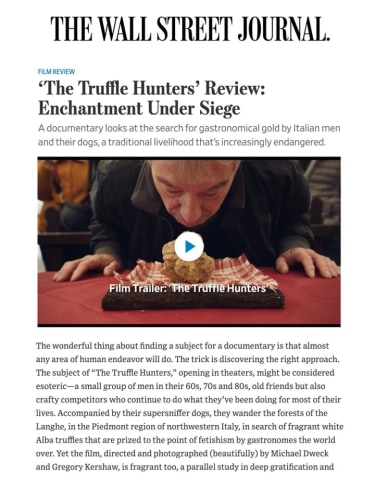‘The Truffle Hunters’ Review: Enchantment Under Siege
Wall Street Journal
03/04/2021
Back
A documentary looks at the search for gastronomical gold by Italian men and their dogs, a traditional livelihood that’s increasingly endangered.
By Joe Morgenstern
The wonderful thing about finding a subject for a documentary is that almost any area of human endeavor will do. The trick is discovering the right approach. The subject of “The Truffle Hunters,” opening in theaters, might be considered esoteric—a small group of men in their 60s, 70s and 80s, old friends but also crafty competitors who continue to do what they’ve been doing for most of their lives. Accompanied by their supersniffer dogs, they wander the forests of the Langhe, in the Piedmont region of northwestern Italy, in search of fragrant white Alba truffles that are prized to the point of fetishism by gastronomes the world over. Yet the film, directed and photographed (beautifully) by Michael Dweck and Gregory Kershaw, is fragrant too, a parallel study in deep gratification and rapt inhalation. The men love their work and the world loves their truffles. What’s not to love about that? Nothing at all, though there are complications, and they make the story even better.
The first two sequences set forth a stark contrast, and an essential conflict. In a hypnotic long shot that opens the film, the camera zooms in slowly on three tiny figures—a man and two dogs making their way up a heavily wooded hillside. Next, in close-up, the three hunters use their fingers and paws to unearth a buried treasure, a hunk of fungus that looks like nothing more than a big pebble. Then cut to a big-city businessman standing in front of a stainless-steel cabinet and contemplating three larger specimens that sit pristine on a folded white towel. With a cellphone to his ear, the dealer informs a customer that he has chosen the truffles “for your president”—perhaps the president of a corporation, though it could just as well be a country—that they are beautiful and round, and smell “fantastic.” And the conflict? Shrinking supply and soaring demand. Foodies are asking more of the enchanted forest than its soil can possibly provide.
It’s rare that a film mixes joy and melancholy with such ease, and to such lovely effect. The truffle hunters are, to a man minus one, remarkably happy. The exception is 78-year-old Angelo Gagliardi, a poet and a farmer who used to be an acrobat and claims to have had 50 offers of marriage. He has quit the hunt out of disgust at greedy people who want to plunder the land he reveres.
The others rejoice in the length and fullness of their lives. At age 84 Aurelio Conterno is considered the best truffle hunter of the group. Some would say he lives alone, but that’s not the way he sees it, sharing as he does his home, his dinner table—including truffle dishes—and the secrets of his soul with his beloved dog, Birba. In a joint service for 88-year-old Carlo Gonella and his dog, Titina, a priest asks God’s blessings for the hunter’s continued good health, and for Titina’s sense of smell, “which is precious and helps with the hunt.” The priest also reassures Carlo that he will be hunting truffles in the afterlife.
But how long can truffles survive in this life? Although the film is sermon-free, the picture it paints isn’t bright. Truffles can’t be cultivated. It takes a forest to raise them, and this one, like so many elsewhere, is under attack from all sides—climate change that’s drying the trees, deforestation that’s felling them, urbanization that’s shrinking the boundaries, and commodification of a delicate specialty that expresses itself in hordes of amateur hunters, along with poachers who recognize no property lines and set strychnine-laced bait to kill rivals’ dogs. (Veteran hunters keep a supply of hydrogen peroxide in their trucks or cars in case they need to make their dogs vomit up poison.)
“The Truffle Hunters” is satire-free as well. Blessed with deftness, the filmmakers let people speak for themselves at the pinnacle of truffle commerce, where buyers in gallery settings that owe no apology to Sotheby’s inspect fungal merch that’s displayed on red velvet cushions, and sniff it studiously, their nostrils alert to incoming molecules.
Back in the countryside, though, the old hunters speak more eloquently—of lives well lived, and dogs well loved, of the pleasure they have always taken in the taste and aroma of truffles, and the greater pleasure of walking, climbing and digging their way through their latter years as venerable creatures of what forest still remains.